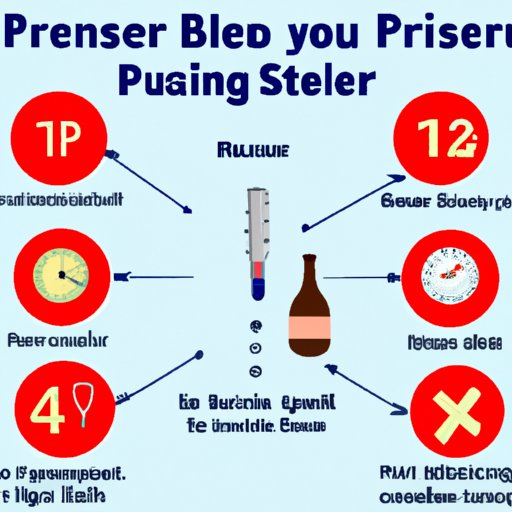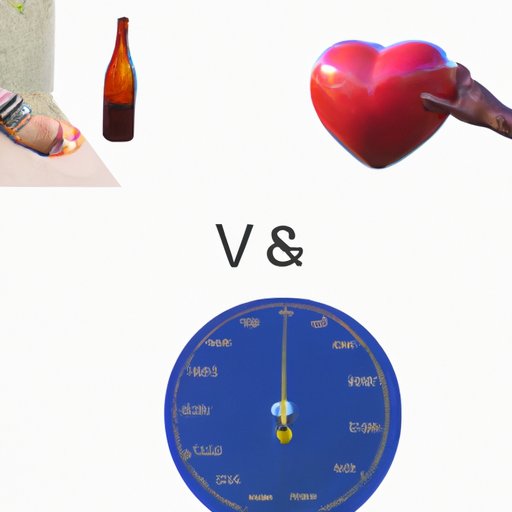
I. Introduction
Taking medication for high blood pressure is a common necessity for many people, and it’s natural to wonder about the effects of alcohol consumption on blood pressure medication. While alcohol alone can raise blood pressure levels, the potential for negative interactions between the two is cause for concern. In this article, we explore the dangers of mixing blood pressure medication with alcohol, as well as tips for safe drinking and alternatives to alcohol.
II. The Dangers of Mixing Blood Pressure Medication with Alcohol
When you take blood pressure medication, the goal is to lower your blood pressure and reduce your risk of serious health problems like heart disease and stroke. However, drinking alcohol while taking these medications can interfere with their effectiveness and even increase the risk of negative side effects. Alcohol can cause blood pressure to rise and can also amplify any side effects of the medication you’re taking.
According to a study published in the American Journal of Cardiovascular Drugs, alcohol consumption can lead to greater fluctuations in blood pressure levels in people taking blood pressure medication. This can increase the risk of heart attacks, strokes, and other cardiovascular events among those who drink excessively.
III. Tips for Drinking Safely While on Blood Pressure Medication
If you choose to drink alcohol while taking blood pressure medication, it’s important to take steps to reduce the risks. Here are some tips:
– Drink in moderation. The American Heart Association recommends that men should have no more than two drinks per day, and women should have no more than one per day.
– Stay hydrated. Drink plenty of water before and during drinking to stay hydrated.
– Space out drinks. Don’t drink too much too fast – give your liver time to process the alcohol.
– Choose low-sodium options. Some alcoholic drinks and mixers are high in sodium, which can raise blood pressure levels. Opt for low-sodium options when possible like a wine spritzer or light beer.
– Maintain a healthy lifestyle. Regular exercise and healthy diet can help mitigate some of the risks associated with alcohol consumption.
IV. Alternatives to Alcohol
If you don’t want to drink alcohol while taking blood pressure medication, know that there are other options. Many bars and restaurants offer non-alcoholic mocktail drinks, which can be a fun alternative. You can also try non-alcoholic beer or other low-alcohol options that don’t interfere with blood pressure medication.
Here are some suggestions for tasty non-alcoholic drinks:
– Virgin margarita: mix lime juice, sweet and sour mix, and crushed ice.
– Sparkling grape juice with a splash of pomegranate juice.
– Fruity smoothies with fresh fruit and ice.
– Sparkling water with a splash of natural fruit juice.

V. Interactions Between Blood Pressure Medication and Alcohol
Some types of blood pressure medication can interact with alcohol differently, leading to increased risks. For example, when combined with beta-blockers, alcohol can lead to low blood pressure levels and fainting. When combined with ACE inhibitors, alcohol can increase the risk of kidney damage.
If you’ve been drinking while taking blood pressure medication and experience dizziness, nausea, lightheadedness, or any other unusual symptoms, seek medical attention.
VI. The Importance of Discussing Alcohol Consumption with Your Healthcare Provider
It’s important to discuss your alcohol consumption with your healthcare provider if you’re taking medication for high blood pressure. They can provide guidance on safe drinking levels and help you make informed choices. Be honest with your healthcare provider about how much and how often you drink, so they can provide the best care possible.
VII. Personal Anecdotes or Case Studies
Unfortunately, there are many examples of people experiencing negative effects from combining blood pressure medication with alcohol. According to a report from the World Health Organization, alcohol use is a major contributor to hypertension and related diseases. Stories and case studies from those who have experienced serious health problems from mixing the two can help illustrate the risks involved.
VIII. The Effects of Alcohol on Blood Pressure and Hypertension
Alcohol consumption can increase blood pressure levels, even in people without hypertension. When combined with blood pressure medication, the effects can be amplified. According to a study in the journal Hypertension, even moderate levels of alcohol consumption can increase the risk of hypertension.
IX. Conclusion
In conclusion, while having a drink can be a fun social experience, doing so while taking blood pressure medication can be a risky endeavor. It’s important to be thoughtful and informed when it comes to alcohol consumption while on blood pressure medication. With the right information and strategy, you can still enjoy the occasional drink while prioritizing your health. If you’re struggling to balance your medication and alcohol consumption, don’t hesitate to seek out additional resources or support.




